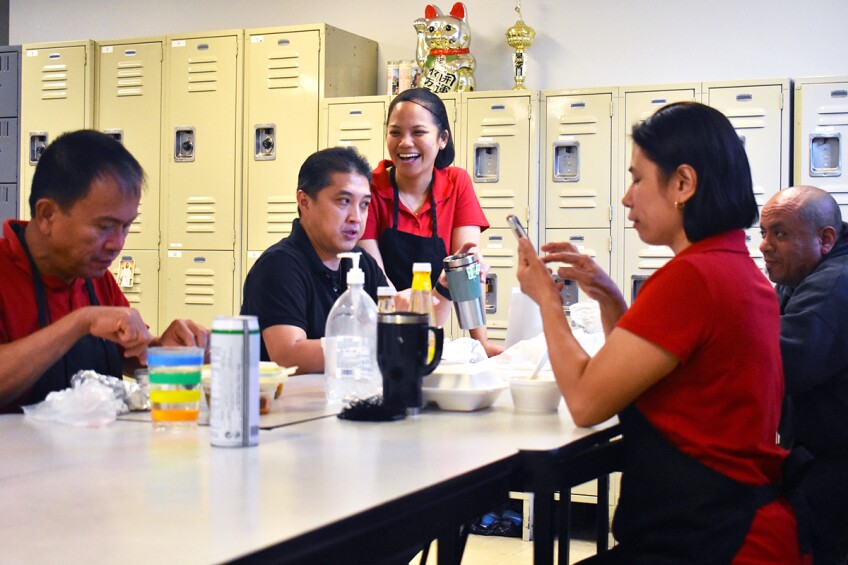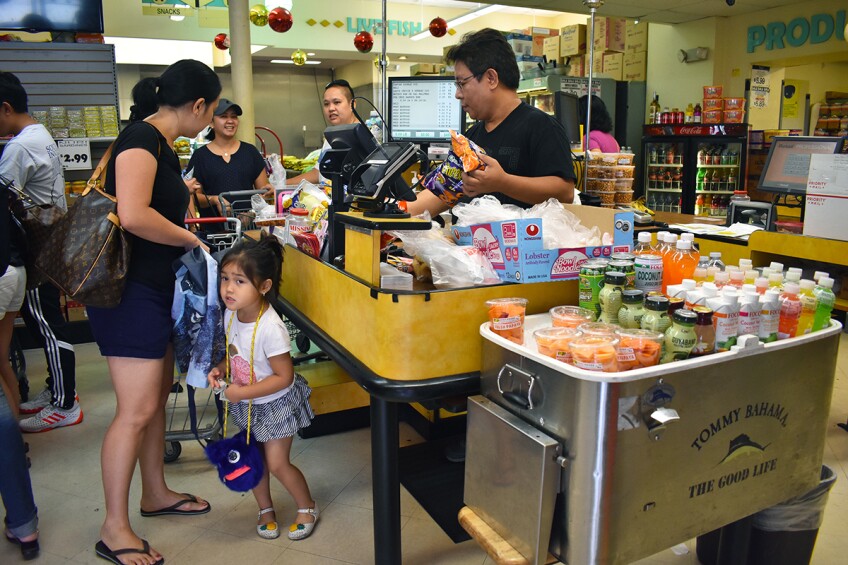Arko Foods Market: Bridging The Filipino Community Through Turo-turos

Yellow incandescent lights, slightly yellowed and oily glass cases paired off with a group of cooks dishing out a fresh batch of adobo and talking about the latest tsismis, gossip — sights like these are commonplace of any ol' turo-turo place. Originating from turo, Filipino for “to pick” or “to point,” turo-turo's are Filipino-run mom and pop fast food joints. Oftentimes, you'll hear exchanges between the customers and cooks along the lines of "Aba, baka magsisi ako!" (Ah, I might regret it!) or "Hindi, hindi! Masarap iyan!" (No, no! It (tastes) good!) as they debate over which foods to choose from the buffet layout of Filipino foods like balut (fertilized duck egg) and dinuguan (pig’s offal cooked in pig’s blood, vinegar and spices). Despite Filipino cuisine having many similar elements of exoticism that makes other Asian foods like sushi and pho popular for mainstream culture, there’s this common misconception that it’s unhealthy, greasy and fattening. A large contributor to this belief is because of the turo-turo’s ubiquity compared to individual Filipino sit-down restaurants and contemporary food ventures like LASA in LA's Chinatown, Manila Sunset in Hollywood and The Park’s Finest in Echo Park.


Specifically, because turo-turos serve their freshly cooked food on buffet servers and hot plates, there’s this stereotype that the food’s uncooked and cheaply made. This unfortunately explains why many non-Filipinos think Filipino food is bad since the hot plate will of course continue to cook the food and make it “greasy.” Yet this feature of turo-turos is what makes the food more authentic. This set-up shows how turo-turos have become vital community resource by serving a large quantity of foods so that a hard-working nurse or accountant could easily pick up dinner after a grueling day at work. While speaking to Oi Asian Fusion's owner and chef Eric de la Cruz, he recounts his dad’s commitment to work up to "18 hours a day without a day off, working any job that would be available to him, then eventually moving up through hard work." Experiences like these are very common in the Filipino community because of the high poverty rate. According to the Philippine Statistics Authority, about a little more than 20 percent of the population are considered poor in 2015. For both non-Filipinos and Filipinos, turo-turo's are received with a mixture of pride and discomfort because of how its existence highlights the Filipino community’s practicality and working-class lifestyle.
Despite the mixed feeling about turo-turos, there’s this deep sense of community that’s similar to family-run businesses that have worked their way up from strife, such as Porto’s Bakery, a multi-branch enterprise that had its roots in Communist Cuba. This familial vibe is exactly what you get upon visiting Arko Foods Market in Glendale. When owner Susie Fong opened Arko in 1980, she asked herself “what’s a business that’d help Filipinos as well?” Upon seeing that the Filipino community here was so busy with making money for their family and themselves, Fong realized that there was hardly any Filipino food for the community to readily enjoy. Many staple Filipino dishes require a lot of time and effort in preparation and cooking, an impractical situation when faced with long work hours.


Derived from arkong bato (stone arch), Arko Foods Market’s name pays homage to the Arkong Bato boundary marker in Valenzuela, Metro Manila, Philippines where the factory and hometown of Fong’s mother was. Apart from being a turo-turo, Arko also serves as a market with a butcher and a remittance service, which is a money transfer service that many FilAms use to send money back to their loved ones in the Philippines. A remittance service is an indispensable feature especially when you consider that in 2016, overseas Filipino workers sent home a total of $26.9 billion, up 5 percent from the previous year. As a small business, you would assume that Arko would charge more for what it offers. But it has always been so affordable and popular – “for around $6 to $10,” according to Fong, “you can have two dishes and a rice.” The servings are so large that you can split it with another person.
In order to ensure the quality of all the products sold by Arko, Fong also has her own factory in the Philippines and a warehouse here in Glendale, which imports most of the store’s Filipino goods like the Datu Puti soy sauce brand that are also used in the turo-turo. Through this, Fong’s able to “keep the original character” of Filipino food. Here, she’s referring to how most mainstream Asian food is so fusion that it tends to strip the cuisine of its “originality.” Take sushi for example – dishes like the California roll are more American than Japanese because it uses imitation crab and has a high rice-to-fish ratio, instead of a high fish-to-rice ratio without extras like avocado or cucumber. So, it’s only natural that Fong worries about making Filipino food too “Japanese, Indonesian...” when it comes to contemporary renditions. Some small ways that Arko helps make their food “match the lifestyle of people” and healthier is through small additions like vegetables to lechon, a roasted suckling pig dish that’s naturally oily.


Another aspect that makes Arko and other successful turo-turo places stand out is how genuinely happy the workers are. There’s a sense of camaraderie and pride amongst Arko’s employees who’ve been working anywhere from forty to seventeen years on average at Arko. Take Ate Clary (Ate means “older sister” and is a sign of respect) for example – she has spent almost thirty years working as the main cook for most of Arko’s dishes. Even the cashiers have also been with Arko for so long – Ate Lydia has been with Arko for twenty-three years already. Her daughter Ashley has also been working as an office assistant for almost six years now. Another surprising fact is how everyone has worked in other roles besides just being a cashier or food server. For example, the office staff like Ate Alona, Ashley and Sarah could be expected to run the cashier and even help serve the food if it gets too busy. Because an average Arko employee’s job description is so multifaceted, this explains why there are some misconceptions that turo-turos are disorganized since the busboy could also be the cashier and deliveryman.
Similar to how Porto’s became popular through the community’s support, Arko and other turo-turo places like D.J. Bibingkahan are also well-known through word of mouth instead of via social media apps like Yelp! or food review articles like Thrillist. Because of this dynamic, Johneric Concordia, The Park's Finest’s owner and chef cautions against fully trusting Yelp! reviews and other social media outlets because these outlets make it hard for "consumers and businesses to fully convey what places really are." There's this risk that reviewers "become the so-called experts (who) sort of snub their noses at the mom and pops." Additionally, websites like Yelp! encourages what Mae Halili, daughter of Ben Halili who runs Manila Sunset, describes as the “crab mentality” where other establishments would talk negatively about other restaurants just to bring themselves up. In her experience, “it only hurts the Filipino cuisine as a whole and always backfires."
Despite these obstacles, since its opening in 1980, Arko Foods Market has become one of Glendale’s vital community resources through literally personifying Arkong Bato, “stone arch.” It has become the archway that brings together the practical and working-class Filipino community over a homecooked meal – turo-turo style of course.








